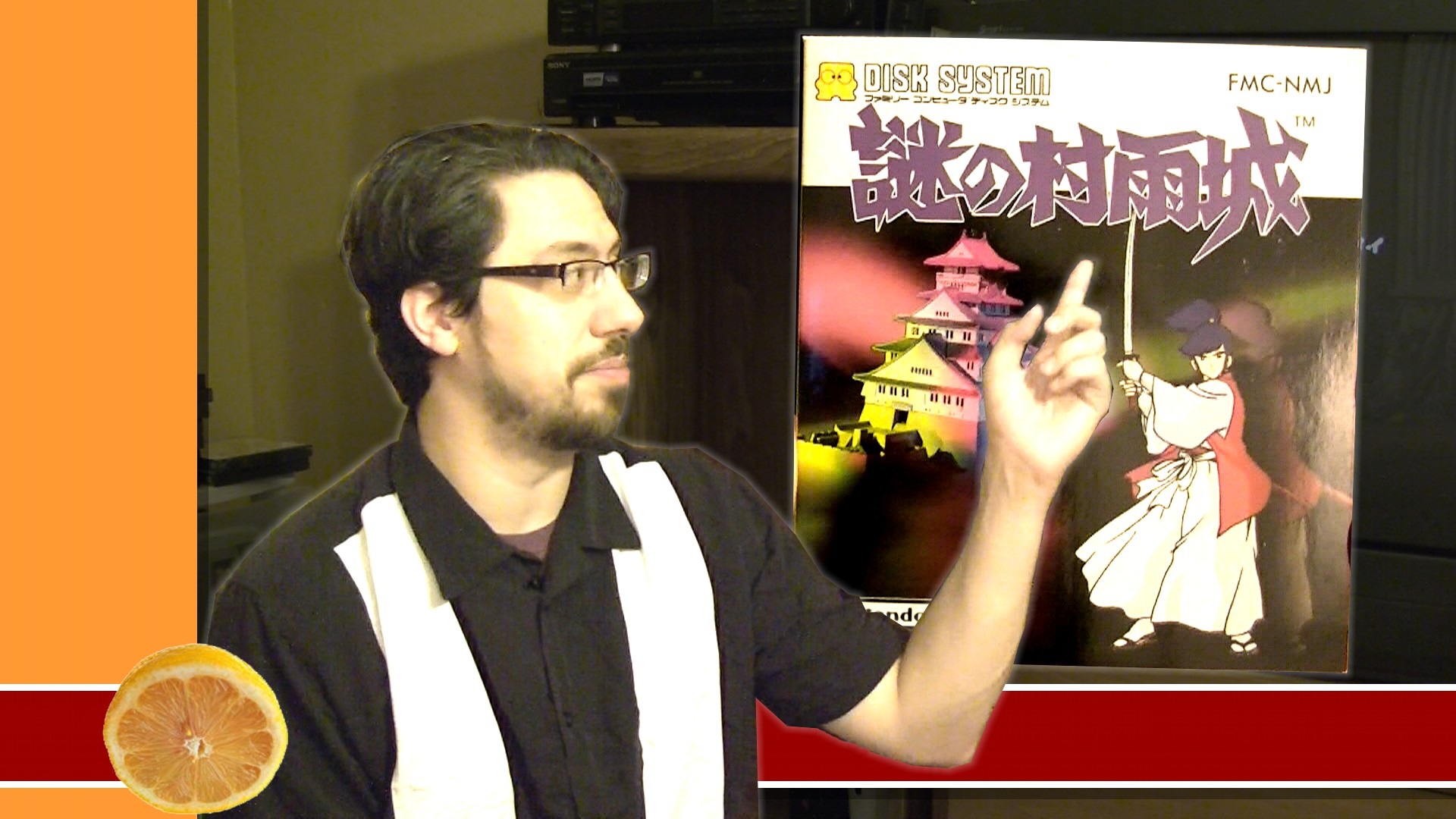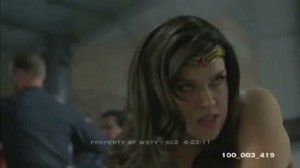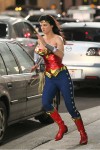Wonder Woman Pilot Fails to Make a Good Point About Vigilantes and the Law
by Adam, filed in Articles, Reviews, TV on Aug.01, 2011
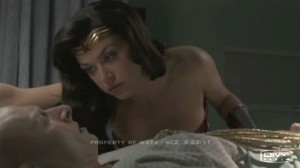
We’ve been following the Wonder Woman show since it’s inception, and although it would now appear that the show will not air, the pilot episode has made it’s way on to the Wild West that is the Internet. I managed to track down a copy and after giving it a good watch, I had many thoughts on it, mainly pertaining to how legal show veteran David E. Kelley has attempted to make an interesting point about Superheroes and the law, but failed to make a compelling argument or to come to a reasonable conclusion on this front.
Continue reading for my full commentary on the topic.
The pilot itself is pretty rough around the edges. One should certainly not criticize it for it’s effects and polish, and this is clearly a work in progress. Included were on screen notes about missing effects, clearly visible wire work that would be removed before airing, and even pieces of dialog spoken by other actors, placeholders to be filled in by ADR. That being said, the story is there for all to see, and it’s largely on this that I would like to comment.
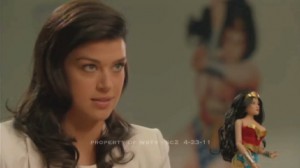
The concept is a bit hard to swallow. This doesn’t so much come off as a Superhero show but more as a David E. Kelley law show that happens to be centring around the life of Wonder Woman. While the costume is jarring and in sharp contrast to the seemingly realistic world we’re surrounding ourselves with, this is shrugged off with the convenient excuse that it was intentionally manufactured to be marketable as an action figure.
David E. Kelley is no stranger to the law. His TV resume includes L.A. Law, Ally McBeal, The Practice, Boston Legal and Harry’s Law. I do not profess myself an expert on his body of work, but I did watch most of his series the Practice, which made frequent attempts to argue the validity of the legal process and how the processes put in place which often seemed to protect the guilty from prosecution were necessary to keep the process honest and to protect the innocent. Wonder Woman seems to take cues from this, as the pilot episode frequently references the legal problems she goes through, attempts by the villains to hide behind the law, and her frustration in dealing with these things.

It seemed as if the show was going to try to make the point that Wonder Woman, and by this logic all heroes and vigilantes we are fans of, are not and should not be above the law, that these laws exist for a reason and that Superheroes should be kept in check by conforming to them. Ultimately this does not appear to be the takeaway message of the show.

At one point we see Wonder Woman holding a press conference, calling out the show’s villain for illegal activities. She mentions she knows about the illegal things she’s doing, but can’t prove it. Basic logical problem here. If a person can’t prove something to themselves, they have no reasonable reason to believe it. This wasn’t a matter of her seeing or hearing something she couldn’t pass on, she simply had no evidence to back up her slanderous comments. This insinuates some sort of divide between what is knowable, and what is knowable by the law. Many things are not considered knowable by the law and that is generally because they aren’t reliable. This is why people don’t go to jail based on hunches, lie detector tests, psychic predictions or as the result of an illegally coerced confession.
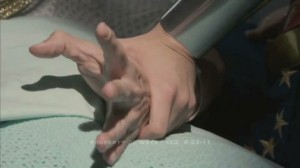
When a frustrated Wonder Woman wishes to get things done she tortures a suspect and in doing so obtains useful information from him. This on it’s own is very dubious TV, and a problem which occurs in lots of fiction. Time and time again we’ve learned that torture is not a reliable way of getting information. Perhaps the bigger concern is how morally vacuous it is to support torturing a person, but beyond the ethical considerations, it’s simply not effective. Every time a fictional story portrays torture as being a valid way of obtaining accurate information, this instills the idea in the public that torture works. While shows will usually dwell on the moral question of whether it’s justified, they still generally display it as working when applied as a last resort.
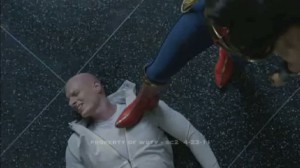
So Wonder Woman tortures a guy, and while it’s stated straight up that this is no way to be able to legally get the information she needs, and it really seems like she wasted her time and is going to learn her lesson, well she just goes ahead and uses that to go bust up the bad guys and… somehow wins the day? The legal loophole seems to be that the police were only called to the site because of the disruption, and then learning of the illegal activities could arrest the bad guys. Well this is a really disappointing end to a questionable series of events which should have ended in Wonder Woman’s arrest. Surely this kind of behaviour is par for the course in Superhero fiction, but after what it looked like this show was trying to tell us about vigilantes and the law, I found this ultimately fell on it’s face.
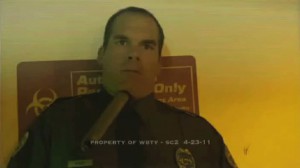
I get the feeling that if this series had continued, maybe it would have been able to make better point about this. Maybe next week the bad guys were going to be let free because of the shitty process that was followed and after going too far we could see Diana learn her lesson about the law, and ultimately work with the police and legal system to be a law abiding Superhero. But there will likely be no continuation for this series. As we see it the legal process that is meant to protect the innocent from illegal coercion, torture, unlawful search and such fun things exists only as a shield for villains to hide behind.

We won’t be seeing the innocent guy who’s been interrogated for 16 hours straight and admits to a crime he didn’t commit here. The sad fact is that in our society a ton of people still give false confessions. These are generally forced out of suspects by police who themselves legitimately believe they are doing the right thing by getting the bad guy. Here we have Wonder Woman, who is presented as a just and moral character who the audience has full confidence in, and so we have no problem with her deciding who is right and wrong. Realistically, vigilantes are fallible humans with prejudices of their own. We can’t simply expect a random person not affiliated with the police to be able to make decisions for themselves on who should and shouldn’t be punished. People’s perceptions are flawed and there’s an elaborate legal system in place to attempt to determine guilt so that such biases will be ignored as much as possible.
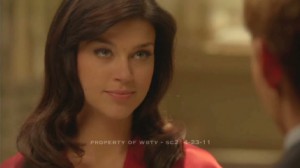
As a thought experiment imagine a Superhero vigilante not as someone who always knows right from wrong, but as someone who just thinks they do. What if the hero was a Nationalist who went around fighting illegal immigrants? Our hero drives by a hardware store, rounds up migrant workers, tortures them to find the identity of other illegals, rinse, repeat. Pretty horrible by most people’s standards, but hey it’s just a vigilante stopping people breaking the law and not letting all that red tape get in the way. Maybe the hero could be a Communist who’s murdering evil imperialists. Maybe a religious extremist attacking all non believers. No one would care for or sympathize with these characters, but these people would probably feel just as certain that their actions are good as Wonder Woman does. The sad truth is that real vigilantes are a lot more like this.
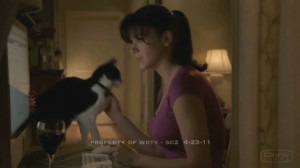


 PS3
PS3
 Famicom Dojo
Famicom Dojo KEEP PLAYING
KEEP PLAYING KEEP PLAYING: Rewind
KEEP PLAYING: Rewind Powet Toys
Powet Toys Powetcast
Powetcast Hitchhiker's Guide POWETcast
Hitchhiker's Guide POWETcast




